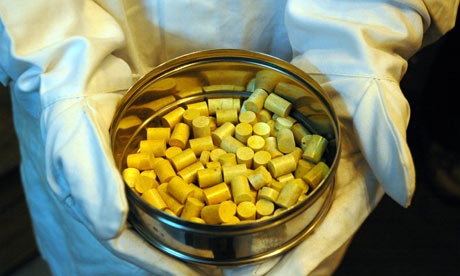
http://www.theguardian.com/environment/blog
Scientists and private firms in China have embarked on a major new push to develop liquid-fluoride thorium reactor technology
• Video: Manchester Report - Thorium nuclear power
• Video: Manchester Report - Thorium nuclear power
Thorium pellets. Photograph: Pallava Bagla/Corbis
Imagine how the nuclear energy
debate might differ if the fuel was abundant and distributed across the
world; if there was no real possibility of creating weapons-grade
material as part of the process; if the waste remained toxic for
hundreds rather than thousands of years; and if the power stations were
small and presented no risk of massive explosions.
What you're imagining could fairly soon be reality judging from a little-noticed development in China last month.
Two years ago, as part of the Manchester Report, a panel of experts assembled by the Guardian selected nuclear power based on thorium rather the uranium as one of the 10 most promising solutions to climate change.
Thorium – which is found in large quantities across much of the world – could be used to create nuclear energy in various ways. But the approach that impressed the Manchester Report panel so much was a currently obscure technology called the liquid-fluoride thorium reactor (LFTR).
I wrote at the time:
Despite not making a ripple in the wider press, there's a chance this development could be very significant. If the advocates of LFTRs are proved correct – and their arguments are certainly very compelling – then the Chinese could be taking one of the first substantial steps in a new type of nuclear race. And the stakes are high: as Sorensen reports, the project "aims not only to develop the technology but to secure intellectual property rights to its implementation". It will be very interesting to see what happens next.
What you're imagining could fairly soon be reality judging from a little-noticed development in China last month.
Two years ago, as part of the Manchester Report, a panel of experts assembled by the Guardian selected nuclear power based on thorium rather the uranium as one of the 10 most promising solutions to climate change.
Thorium – which is found in large quantities across much of the world – could be used to create nuclear energy in various ways. But the approach that impressed the Manchester Report panel so much was a currently obscure technology called the liquid-fluoride thorium reactor (LFTR).
I wrote at the time:
"This technology was developed by the US military in the 1950s and 1960s and was shown to have many benefits. For example, reactors of this type can be smaller than conventional uranium reactors, partly thanks to their low-pressure operation. Despite its early promise, research into liquid-fluoride thorium reactors was abandoned – the most likely reason being that the technology offered no potential for producing nuclear weapons."There's a big difference between a demonstrably good idea and a multimillion-dollar research and development programme, however, so it's exciting to hear about a major new push to actually develop LFTR technology in China. Thorium-energy expert Kirk Sorensen recently blogged about the announcement of the new scheme at the Chinese National Academy of Sciences in late January. Technology journalist Andrew Orlowski followed up with a story claiming that a private company in China is aiming to build a prototype within five years that can produce electricity at for as little as 6.8p per kilowatt hour (much cheaper than the retail price of power in the UK today).
Despite not making a ripple in the wider press, there's a chance this development could be very significant. If the advocates of LFTRs are proved correct – and their arguments are certainly very compelling – then the Chinese could be taking one of the first substantial steps in a new type of nuclear race. And the stakes are high: as Sorensen reports, the project "aims not only to develop the technology but to secure intellectual property rights to its implementation". It will be very interesting to see what happens next.

No comments:
Post a Comment